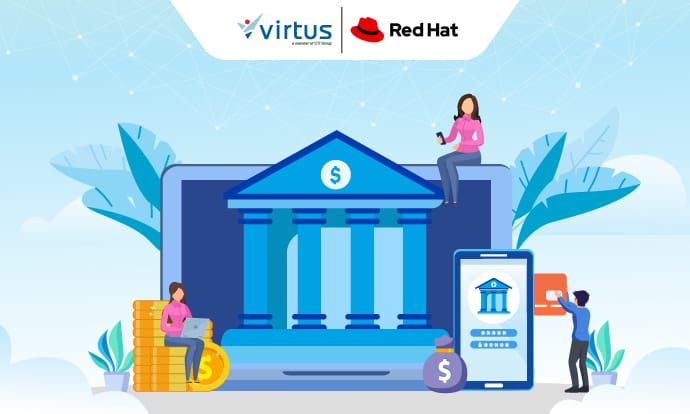The financial industry is currently undergoing a rapid and profound digital revolution. Every business sector, including finance, is compelled to innovate services to remain competitive amidst fierce competition and adapt to customers’ shift towards digital platforms.
However, the journey toward digitalization is not without challenges. Issues such as data security, 24/7 service demands from customers, diverse platforms, and the need for rapid response to digital feature updates pose significant challenges. This is where container and virtualization technologies, like those embedded in solutions such as the OpenShift Container Platform, play a crucial role.
But what exactly are containers and virtualization? Why are these technologies so essential for tackling challenges in the digital era, particularly in the financial sector? Let’s dive deeper
What Are Containers and Virtualization?
Virtualization is a technology that enables a single physical device to run multiple Virtual Machines (VMs) simultaneously. Each VM has its own operating system and applications, functioning like separate computers even though they share the same hardware.
Through virtualization, hardware resources can be optimized, allowing a single physical server to run various services and applications efficiently. For companies, this translates to cost savings, as there’s no need to buy multiple servers for each different application. This technology is ideal for running larger traditional applications (also known as monolithic applications) because it simplifies management and increases flexibility in hardware use.
On the other hand, containers are a lighter technology compared to traditional virtualization. Containers package applications along with their dependencies in isolated units that share the same operating system kernel. This makes containers faster, more portable, and efficient, as they don’t require loading a full operating system like VMs do. Container technology allows applications to run consistently across various environments—whether in the cloud, on servers, or on local devices—while also supporting modern, microservices-based applications to enhance application reliability.
Benefits of Containers and Virtualization in the Digitalization Process of the Financial Industry

The benefits of containers and virtualization in the financial industry are substantial, as these technologies help address complex and dynamic operational challenges, optimize infrastructure, and support service innovation. Here are some key advantages:
Cost and Resource Efficiency
By running multiple VMs on a single physical server, companies can reduce hardware, maintenance, and server space costs. Containers, being lighter, allow applications to operate with lower resource consumption, further saving costs, especially when combining modern and traditional applications on a single platform.
High Availability and Scalability
Containers and virtualization enable high availability by providing automated failover mechanisms between nodes and autoscaling capabilities. This is crucial in financial services, where application or payment system downtime must be avoided.
Security and Data Isolation
In the financial sector, data security is a top priority. Virtualization provides full isolation between VMs, ensuring that if one machine encounters an issue, other VMs remain unaffected. Containers, though lightweight, also offer isolation at the application level, ensuring that applications and their data are separated and protected from potential threats, supported by layered security mechanisms.
OpenShift Container Platform as a Solution to Address Digitalization Challenges in the Financial Sector
The OpenShift Container Platform (OCP) is a Kubernetes-based solution designed to manage and run applications using container technology. OCP provides an infrastructure that leverages Kubernetes as a container orchestrator, enabling companies to deploy, manage, and optimize their applications more efficiently.
With the capability to operate across diverse environments—whether on bare metal, various virtualization technologies, or in the cloud—OCP allows organizations to maximize their IT resources. The platform also includes features that support the automated development, testing, and deployment of applications, enhancing developer productivity.
OCP is particularly well-suited for the financial sector for several reasons. First, security is a top priority in this industry. OCP comes equipped with robust security features, including data encryption, Role-Based Access Control (RBAC), and audit logging. These features ensure that sensitive data, such as customer information and financial transactions, is protected from cyber threats, providing companies peace of mind as they conduct their operations.
In addition to security, OCP offers high scalability and availability, which are critical in the financial sector. With autoscaling capabilities, OCP can automatically adjust application capacity based on user demand.
Finally, by adopting a DevOps approach, OCP facilitates collaboration between development and operations teams, enabling them to release new products and services faster. Continuous Integration/Continuous Delivery (CI/CD) tools further accelerate the development and launch cycles of new applications, helping companies remain relevant and responsive to the ever-evolving needs of their customers.
Key Features of OCP for the Financial Industry
OpenShift Container Platform (OCP) has several standouts features specifically designed to meet the needs of the financial industry. Here’s an overview of these features:
1. DevOps and Agile
OCP supports DevOps and Agile methodologies, which are crucial in modern software development. With Continuous Integration/Continuous Delivery (CI/CD) features, OCP makes it easier for development teams to release applications and updates quickly. This allows for faster iterations and responsiveness to user feedback.
2. Strong Security
Data security is one of the most important aspects of the financial sector, and OCP offers various robust security features. These include data encryption in transit and at rest, as well as Role-Based Access Control (RBAC) that enables role-based access management.
Additionally, OCP is equipped with audit logging, providing visibility into user activities and helping detect and respond to potential security breaches. With these protections, financial companies can reduce the risk of data breaches and ensure compliance with stringent regulations.
3. Integration with Other Technologies
One of OCP’s advantages is its ability to integrate with various existing technologies within financial enterprises. OCP supports APIs that allow connection with legacy applications and systems, including databases and analysis tools that have been previously used. This integration capability enables companies to leverage their existing technology investments while adopting a container-based architecture.
4. Scalability and Flexibility
OCP is designed to provide the scale and flexibility that financial businesses require. With auto-scaling features, OCP can automatically adjust application capacity based on user demand. This is crucial in the financial sector, where transaction volumes can fluctuate significantly, such as at month-end or during annual reporting. OCP also allows applications to run in various environments, both on-premises and in the cloud.
5. Real-Time Monitoring and Analysis
OCP is equipped with monitoring tools that allow companies to gain real-time insights into application and infrastructure performance. With monitoring and logging features, companies can track application performance, detect anomalies, and identify issues before they become critical. This analysis enables IT teams to make better and faster decisions, improving overall operational efficiency.
Successful Implementation of OCP in the Financial Industry

Bank Mandiri, Indonesia’s largest bank by assets, adopted Red Hat OpenShift to support its digital service infrastructure, especially for the Livin’ by Mandiri app. By utilizing a container and microservices-based approach, Bank Mandiri can now update features for over 13 million users in under an hour while maintaining service availability of up to 99.95%, even during peak demand. This solution offers customers a faster, more efficient banking experience—from account opening to e-wallet transactions—all within a single, integrated application.
The decision to use Red Hat OpenShift also allows Bank Mandiri to leverage autoscaling capabilities to efficiently handle high demand, with an average microservice response time of just 150 ms. This helps the bank meet customer expectations for fast, responsive services, especially during peak times like national holidays. Bank Mandiri can handle up to 12,000 requests per second, ensuring service stability that customers rely on, without disruptions.
With a secure, modular architecture and professional support from Red Hat, Bank Mandiri achieves 99.95% service availability. The DevSecOps system in place ensures code quality prior to release, reducing the risk of service interruptions. This technology not only improves operational efficiency but also enhances flexibility, enabling Bank Mandiri to continue innovating in providing modern, responsive digital banking services for customers across Indonesia.
Explore the Benefits of Red Hat OpenShift for the Financial Industry or Other Industries Only at Virtus
After reading this article, you may begin to understand the importance of adopting modern technologies like OpenShift Container Platform to enhance efficiency, security, and innovation in your company. With the increasingly complex challenges faced by the financial industry and other sectors, investing in virtualization and OCP is no longer just an option but a strategic necessity. OCP provides a strong foundation for digital transformation, enabling companies to be more responsive to market changes and customer needs.
As part of the PT Computrade Technology International (CTI) Group, Virtus has built a strong reputation through a commitment to excellent service, high responsiveness, and reliability for business partners and end-users. Since 2007, Virtus has extensive experience and expertise in implementing OCP across various industries, including finance.
Moreover, with our strategic partnership with Intikom, we are able to offer integrated and targeted solutions to enhance your business operations. We will collaborate with your team to analyze your company’s specific needs and design the most effective implementation plan. With us, you can ensure that your technology investments will deliver maximum and sustainable results.
Don’t hesitate to contact Virtus today for a free consultation on how OCP and virtualization can benefit your company. Our team of experts is ready to assist you at every step of the digital transformation process, from needs evaluation to implementation and ongoing support. Together with Virtus, enhance your company’s efficiency and competitiveness in this increasingly competitive market!
Author: Ary Adianto
Content Writer CTI Group



























